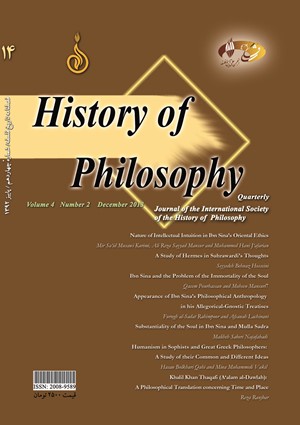Nature of Intellectual Intuition in Ibn Sina’s Oriental Ethics
Subject Areas : Etymology of philosophical termsMir Sa‘id Musawi Karimi 1 , Ali Reza Sayyad Mansur 2 , Muhammed Hani J‘afarian 3
1 -
2 - University of Tehran
3 -
Keywords: Ibn Sina epistemology intellectual intuition intutionists ,
Abstract :
The purpose of this paper is to determine the nature of Ibn Sina’s idea concerning the ethical epistemology of oriental works entitled “intellectual intuition”. In the study of the nature of intellectual intuition, the focus is placed on its component parts. In other words, we will pay attention to elements which Ibn Sina considers as the sources of the acquisition of ethical knowledge under the title of intellectual intuition, and it appears that this kind of intuition results from a combination of these elements. Therefore, here the writers initially introduce the epistemological elements of intellectual intuition following a modern approach and maintain that intellectual intuition consists of three epistemological elements of intuition, introversion, and intellect. Then they clarify the role of each of these elements in the epistemological functions of intellectual intuition in Ibn Sina’s view. Next, through explaining the role of intuition in the ethical epistemology of contemporary intuitionists, they try to explore the particular functions of this epistemological layout in the eyes of contemporary thinkers. Finally, through a comparison of their ideas with those of Ibn Sina, the writers provide a more accurate picture of the whatness of intuition and its constituent elements in Ibn Sina’s philosophy.
ابنسينا. حسين بن عبدالله، اشارات و تنبيهات، ترجمه و شرح حسن ملکشاهي، تهران، انتشارات سروش، ۱۳۷۵.
ابنسينا. حسين بن عبدالله، رسالة الطير، ترجمة شهابالدين سهروردي، در: ابنسينا و تمثيل عرفاني، گردآوري و تأليف هانري کربن، ترجمه انشاء الله رحمتي، تهران، انتشارات سوفيا، ۱۳۸۹.
ابنسينا. حسين بن عبدالله، حي ابن يقظان، ترجمه و شرح جوزجاني، در: ابن سينا و تمثيل عرفاني، گردآوري و تأليف هانري کربن، ترجمه انشاء الله رحمتي، تهران، انتشارات سوفيا، ۱۳۸۹.
ابنسينا. حسين بن عبدالله، منطق المشرقيين، قاهره، المكتبة السلفيه، ۱۹۱۰م.
ابنسينا. حسين بن عبدالله، الشفاء، الالهيات، تقديم و تصحيح ابراهيم مدكور، قم، مكتبة آيةالله مرعشي نجفي، 1408ق.
جوزجاني، شرح بر حيابنيقظان، در: ابن سينا و تمثيل عرفاني، گردآوري و تأليف هانري کربن، ترجمه انشاء الله رحمتي، تهران، انتشارات سوفيا، ۱۳۸۹.
خراساني، شرف الدين، «ابن سينا»، دائرة المعارف بزرگ اسلامي، ج4، تهران، نشر مرکز دائرةالمعارف بزرگ اسلامي، 1377.
شمس، منصور، آشنايي با معرفتشناسي، تهران، انتشارات طرح نو، 1387.
کربن، هانري، ابنسينا و تمثيل عرفاني، ترجمة إنشاءالله رحمتي، تهران، انتشارات سوفيا، ۱۳۸۹.
گنسلر، هري جي، درآمدي جديد به فلسفة اخلاق، ترجمة حميده بحريني، تهران، انتشارات آسمان خيال، 1389.
Curley, Edwin (2010), “Rationalism”, A Companion to Epistemology (2nd ed.), edited by Jonathan Dancy, Ernest Sosa, and Matthias Steup, Oxford: Blackwell Publishing.
Cohen, L. Jonathan (2010), “Rationality”, A Companion to Epistemology (2nd ed.), edited by Jonathan Dancy, Ernest Sosa, and Matthias Steup, Oxford: Blackwell Publishing.
Dancy, Jonathan (2010), “Moral Epistemology”, A Companion to Epistemology (2nd ed.), edited by Jonathan Dancy, Ernest Sosa, and Matthias Steup, Oxford: Blackwell Publishing.
Fumerton, Richard (2010), “Foundationalist Theories of Epistemic Justification”, Stanford Encyclopedia of Philosophy.
Hudson, William Donal (1970), Ethical Intuitionism, London and New York: Macmillan.
Huemer, Michael (2005), Ethical Intuitionism, New York: Palgrave Macmillan.
Reese, William L. (1996), Dictionary of Philosophy and Religion (2nd ed.), New Jersey: Humanities Press.
Roeser, Sabine (2011), Moral Emotions and Intuitions, New York: Palgrave Macmillan.
Schwitzgebel, Eric (2010), “Introspection”, Stanford Encyclopedia of Philosophy.
Stratton-Lake, Philip (2010), “Ethical Intuitionism”, The Routledge Companion to Ethics, edited by John Skorupski, London and New York: Routledge.


